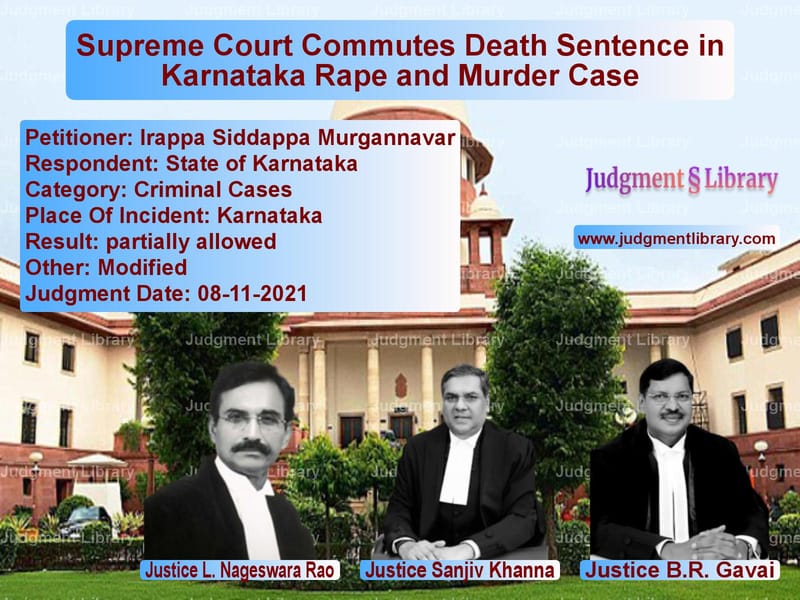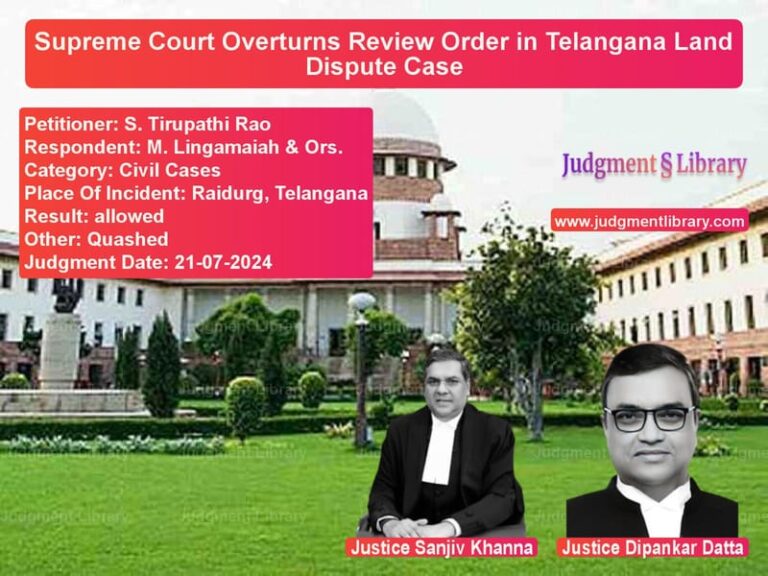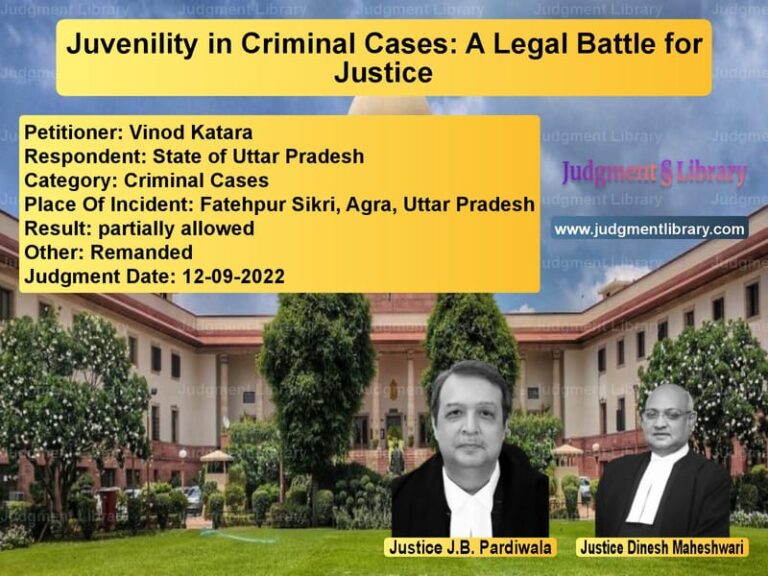Supreme Court Commutes Death Sentence in Karnataka Rape and Murder Case
The case of Irappa Siddappa Murgannavar v. State of Karnataka is a significant judgment where the Supreme Court addressed the legal, procedural, and moral aspects of awarding the death penalty. The case involved the brutal rape and murder of a five-year-old girl, for which the appellant, Irappa Siddappa Murgannavar, was sentenced to death by the trial court and the High Court. However, the Supreme Court, while upholding his conviction, commuted the death sentence to life imprisonment with a condition that he shall not be entitled to remission for at least 30 years.
The judgment highlights the importance of considering mitigating factors, the possibility of reformation, and the legal requirement of a fair sentencing procedure. It reiterates that the death penalty should be imposed only in the ‘rarest of the rare’ cases.
Background of the Case
The prosecution alleged that on December 28, 2010, the appellant lured the five-year-old victim under the pretext of buying her biscuits, sexually assaulted her, strangled her to death, and disposed of her body in a gunny bag into a stream. The case against him was built on circumstantial evidence, including ‘last seen’ evidence, forensic reports, and the recovery of the victim’s body based on his disclosure statement.
The trial court convicted him under Sections 302 (murder), 376 (rape), 364 (kidnapping), 366A (procuration of a minor girl), and 201 (causing disappearance of evidence) of the Indian Penal Code (IPC) and sentenced him to death. The High Court confirmed the conviction and the death penalty, considering the crime’s brutality and the young age of the victim.
Arguments by the Petitioner
The defense argued that:
- The conviction was based on circumstantial evidence, which was not conclusive.
- There were discrepancies in witness testimonies regarding the timeline of the crime.
- The prosecution failed to prove premeditation, which is essential for imposing the death penalty.
- The appellant was young (around 25 years old), had no prior criminal record, and could be reformed.
- The trial court did not properly follow the procedure required under Section 235(2) of the Criminal Procedure Code (CrPC) before awarding the death sentence.
Arguments by the Respondent
The State of Karnataka contended that:
- The crime was heinous, involving the rape and murder of a defenseless child.
- The brutality of the crime justified the death penalty as a deterrent.
- The appellant’s conduct after the crime, including attempts to conceal evidence, showed no remorse.
- The case fell into the category of ‘rarest of the rare’ and warranted capital punishment.
Supreme Court’s Judgment
The Supreme Court upheld the appellant’s conviction but commuted the death sentence to life imprisonment, stating:
“There is no doubt that the appellant has committed an abhorrent crime, and for this we believe that incarceration for life will serve as sufficient punishment and penitence for his actions, in the absence of any material to believe that if allowed to live he poses a grave and serious threat to the society.”
The Court considered several mitigating factors, including:
- The appellant’s young age and lack of criminal antecedents.
- Possibility of reformation, as evidenced by his good conduct in jail.
- Socio-economic background, including poverty and lack of education.
- Failure of the prosecution to prove premeditation beyond reasonable doubt.
The Court also noted that the trial court did not follow the proper sentencing procedure by not granting the appellant a separate hearing on sentencing, violating Section 235(2) of the CrPC. However, instead of remanding the case, the Supreme Court reviewed all factors itself and commuted the sentence.
Conclusion
The judgment reinforces the principle that the death penalty should be imposed only in exceptional cases where no other punishment is sufficient. It underscores the necessity of a fair sentencing procedure and the importance of considering all mitigating factors before awarding capital punishment.
Petitioner Name: Irappa Siddappa Murgannavar.Respondent Name: State of Karnataka.Judgment By: Justice L. Nageswara Rao, Justice Sanjiv Khanna, Justice B.R. Gavai.Place Of Incident: Karnataka.Judgment Date: 08-11-2021.
Don’t miss out on the full details! Download the complete judgment in PDF format below and gain valuable insights instantly!
Download Judgment: irappa-siddappa-murg-vs-state-of-karnataka-supreme-court-of-india-judgment-dated-08-11-2021.pdf
Directly Download Judgment: Directly download this Judgment
See all petitions in Murder Cases
See all petitions in Juvenile Justice
See all petitions in Attempt to Murder Cases
See all petitions in Judgment by L. Nageswara Rao
See all petitions in Judgment by Sanjiv Khanna
See all petitions in Judgment by B R Gavai
See all petitions in partially allowed
See all petitions in Modified
See all petitions in supreme court of India judgments November 2021
See all petitions in 2021 judgments
See all posts in Criminal Cases Category
See all allowed petitions in Criminal Cases Category
See all Dismissed petitions in Criminal Cases Category
See all partially allowed petitions in Criminal Cases Category







